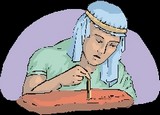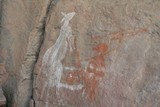Emit – not just some random alien but an intrepid traveller and intergalactic archaeologist.
 Emit Repoons had never liked sitting around his office with his feet up. He was not content with a well-paid desk job and a company rocket. Even when he had just finished a successful mission, he found it hard to settle down at headquarters. No, he preferred the danger and uncertainty of his journeys. He loved gazing into other worlds and explaining their strange characteristics to his own kind.
Emit Repoons had never liked sitting around his office with his feet up. He was not content with a well-paid desk job and a company rocket. Even when he had just finished a successful mission, he found it hard to settle down at headquarters. No, he preferred the danger and uncertainty of his journeys. He loved gazing into other worlds and explaining their strange characteristics to his own kind.
Luckily, Ssob Etad Rekees was always prepared to listen. When Emit burst into her office one day and begged her to send him on a new mission, she had a mission chip ready. As she reached for it, she remarked, “I’ve saved this civilisation for you. It may be a difficult and perilous journey, but I know that will only strengthen your resolve. Good luck. And don’t forget to take Llatiwonk with you. She will be invaluable.”
Emit sighed. True, Llatiwonk was brilliant. She was just the kind of companion he needed. Whenever he wanted to do something rash, she would gently present all the opposing arguments. She was far too rational for his liking. In Emit’s opinion, she’d had too much common sense programmed into her circuits. But of course Llatiwonk would go with him. It was unthinkable and it might even be dangerous to leave her behind.
From Ssob’s outstretched hand, Emit took the chip and inserted it into his trusty pocket pod. When he saw its contents, he knew he was in for an adventure.
Begin your adventure by looking at some of these sites on ancient Egypt…
Play the Mummy Maker Game at the BBC website by clicking here 
Read about the power of the Pharaohs here
View the treasures of Tutankhamen here
Convert your name to hieroglyphs here
-
Finally, keep in mind that Emit is keen, curious and questioning. He can be wild and rash, take risks and do crazy things in his search for knowledge. Llatiwonk, on the other hand, is rational, careful and thorough. Who do you think is more like you? Leave a comment with your answer.









